From eco-conscious building materials to agenda-setting conservation schemes, these hotels are proving that luxury travel can also be green
The days of luxury equating to wanton excess are over. With more and more travellers seeking decadent stays that don’t force them to ditch their values, several cutting-edge eco-friendly resorts are paving the way towards a better-preserved planet, while delivering an abundance of elegance and world-class service. 50 Best checks into seven hotels that are leading the way.
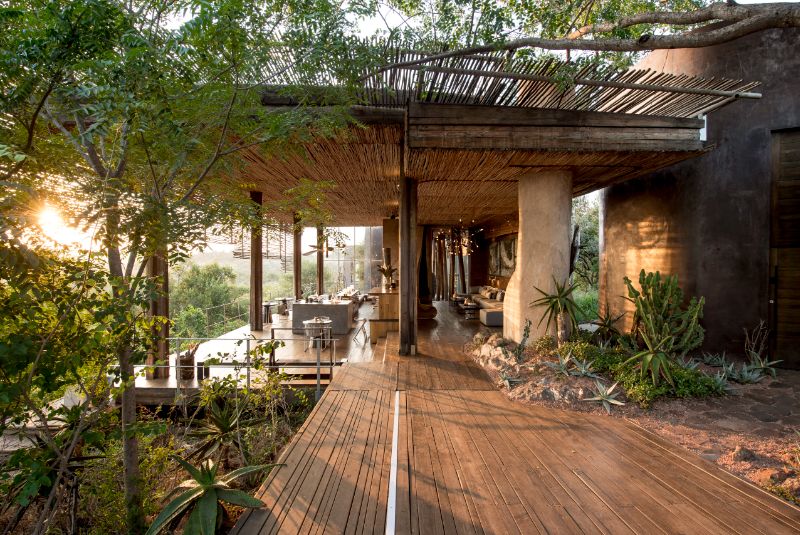
Singita's eagle's nest-inspired Lebombo Lodge
Singita Kruger National Park
@singita_
Winner of The World 50 Best Hotels’ inaugural Flor de Caña Eco Hotel Award in 2023, Singita, nestled in the heart of South Africa’s Kruger National Park, is the benchmark for any establishment looking to blend luxury with ecological guardianship. Its minimal environmental impact, partly achieved through its 92 per cent recycling rate (100 per cent for food waste) and a concerted focus on solar energy, has reduced reliance on diesel by 85 per cent. Additionally, its dedication to promoting, supporting and leading on local conservation efforts that protect flora and fauna makes the resort a shining example of what eco-conscious hoteliers can achieve.
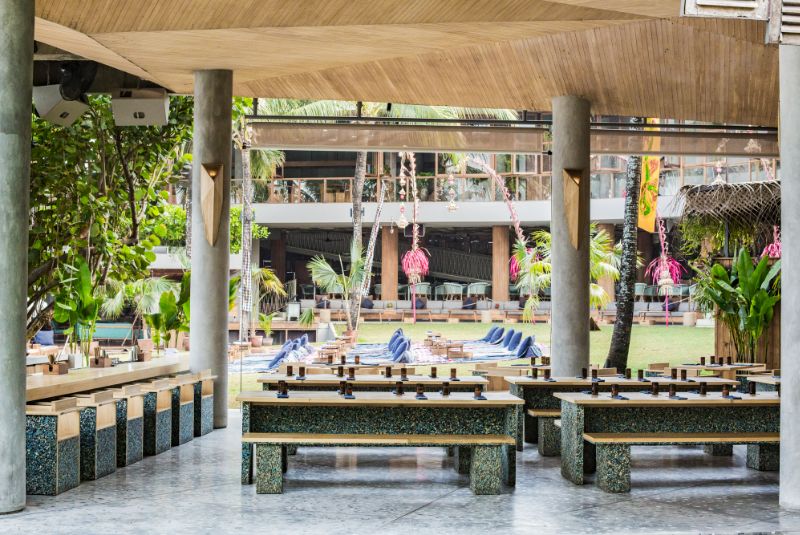
Desa Potato Head's Ijen seafood restaurant
Desa Potato Head, Bali
@potatoheadbali
A unique name for a unique hotel. Desa Potato Head, located in Bali, the Indonesian tourism hotspot with a reputation for heavy partying, is antithetical to the region’s vaunted nightlife scene, enveloping its guests in a sanctuary where sustainability, wellness and cultural immersion take centre stage. Designed with sustainability in mind, it was a regional pioneer in carbon neutrality, which it achieved in 2017. In the same year, the hotel also committed to sorting out its own rubbish on-site, which reduced the amount of waste material sent to landfill from over 50 per cent to three per cent in the space of a few months. The hotel hopes to declare itself a zero-waste establishment in the very near future.
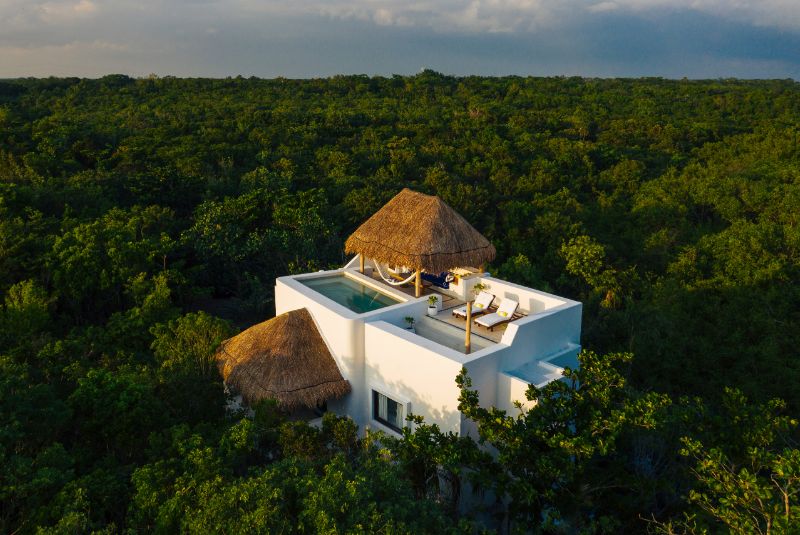
Hotel Esencia's rooftop wellness suite
Hotel Esencia, Quintana Roo
@hotelesencia
Originally built to be the private home of an ex-pat Italian duchess, Hotel Esencia will stun beach lovers and jungle explorers in equal measure. Set on Mexico’s Mayan Riviera, it also happens to be one of the region’s most eco-friendly hotels, voted No. 19 on The World’s 50 Best Hotels 2023 list. As well as composting all organic waste and food scraps, and treating around 300,000 litres of water every day, the team is trained to offer tangible ecological assistance to the local area. Staff participate in a range of conservation projects, from protecting dunes and reforesting the surrounding jungle to annually releasing thousands of baby turtles. Guests are, if they are so inclined, encouraged to participate.
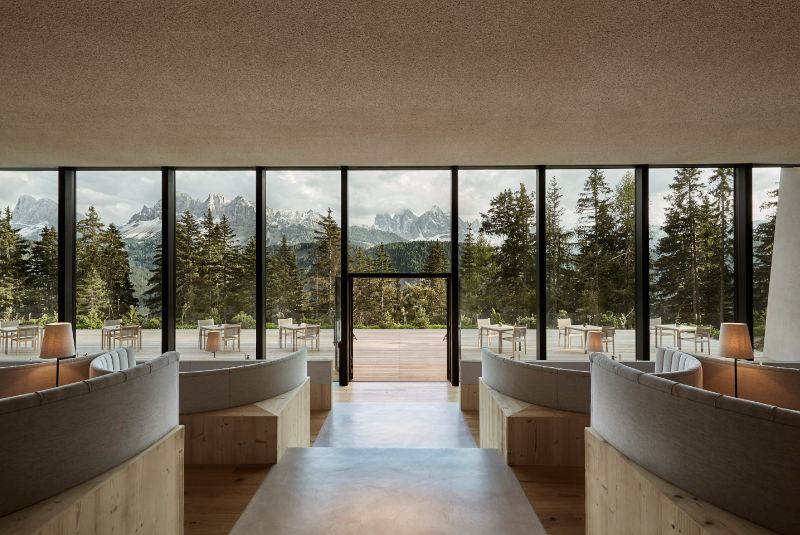
Wild views from Forestis Restaurant
Forestis Dolomites
@forestis.dolomites
It would be a struggle to find a hotel set in more sensational surroundings, nor are you likely to find one with such lofty eco-credentials. From its CO2-neutral construction to its no-waste policy, this Italian jewel has made moves to embed sustainable practices site-wide. Local trees were felled to create the fencing around the hotel, with two new saplings planted for every one that was cut down. The entire property is powered by renewable energy, water is sourced from a nearby spring, and the interior finishes, furniture and homewares were all supplied by local businesses and artisans.
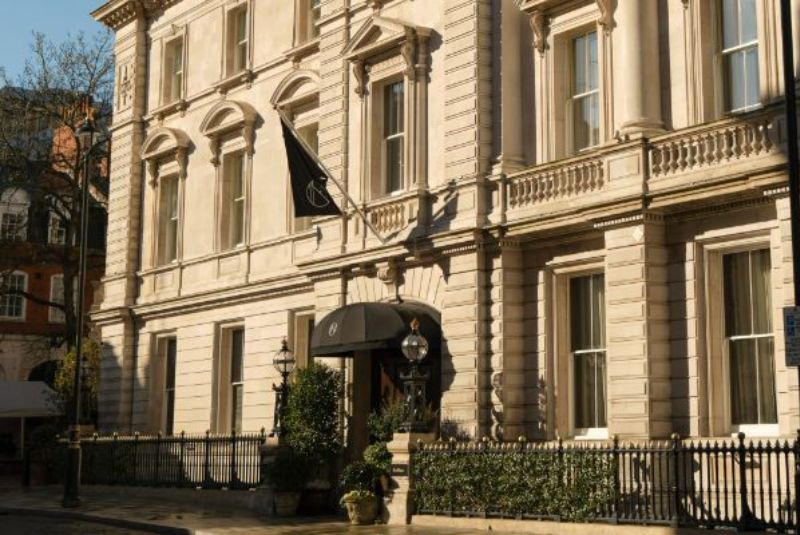
NoMad London's stately facade
London is, believe it or not, the world’s largest urban forest. It’s where concrete sprawls live alongside centuries-old woodlands, and the NoMad London captures the very best of these disparate worlds. Set in buzzing Covent Garden, the hotel (which appears on The World’s 50 Best Hotels 2023 list) has solar panels, uses refillable toiletries (which reduce plastic waste by more than 600kg annually), and gives guests bamboo toothbrushes, as well as amenities packed in paper or cornstarch. Its kitchen though, is its eco-friendly showpiece, where chefs optimise all waste they produce, from fish bones and parsley stems for broths and oils to used cooking oil, which is collected and repurposed.

The ultra-elegant Art Deco Deluxe Double Room at Sommerro (Image: Francisco Nogueira)
Sommerro, Oslo
@sommerrohouse
Norway is often named one of the world’s most environmentally aware countries, so it’s unsurprising that it’s home to a stack of luxury, eco-conscious hotels. Among them is this art deco retreat in Oslo, which uses 100 per cent renewable energy, harvests locally sourced ingredients, and provides free parking and charging for electric vehicles. It also has partnerships with several inspiring local organisations, including New Movements, a sustainable Norwegian footwear brand which provides shoes for the hotel’s staff, and social enterprise Sisters in Business, which employs female immigrants to produce textiles and fix broken garments.
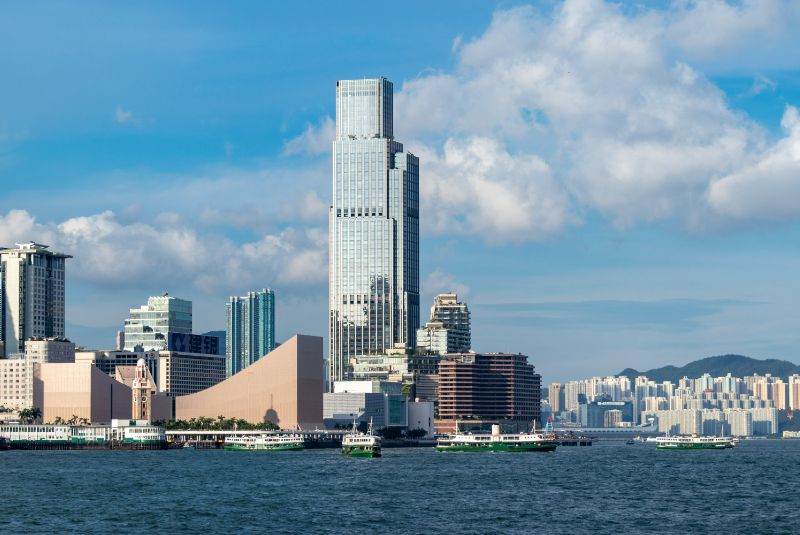
The sky-skimming Rosewood Hong Kong on the Kowloon peninsula
Rosewood Hong Kong
@rosewoodhongkong
This 65-storey architectural marvel, which opened in 2019, is already an established part of Hong Kong’s stratospheric skyline, but it’s what’s going on inside the hotel that really deserves attention. From its zero-waste initiative, which incorporates everything from packaging to composting, to its partnership with Clean the World, a soap recycling programme, almost every aspect of Rosewood’s operation leans heavily on being sustainable. Notably, in 2020 the hotel committed to purchase 13 GWh of renewable energy through Renewable Energy Certificates from 2020 to 2026, reducing its carbon emissions by approximately 4,800 tonnes – equivalent to planting 208,000 trees.
.jpg)
